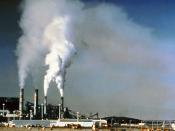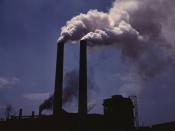Air Pollution: A Global Problem
Air Pollution is the addition of harmful substances into the atmosphere resulting in continuing damage to the environment, human health, and the quality of life we experience. The study of atmospheric or air pollution covers all those pollutants that are omitted into the atmosphere, usually as gasses or particulates, which then directly or indirectly degrade the physical and biological systems on the surface of the Earth (Welburn 1). It not only affects people but also harms plants, animals and the ecosystems in which they live. It is changing the earth's atmosphere so that it lets in more harmful radiation from the sun. While at the same time, our polluted atmosphere is becoming a better insulator preventing heat from escaping back into space and leading to a rise in global average temperatures. Today, man is capable of damaging many of the Earth's natural cycles. It appears inevitable that the extent of such potential disturbances keeps growing with the increase in the world's population and the rate of industrialization (Breuer xi).
Air pollution exists in gaseous or particulate forms. The latter are particularly diverse in character, consisting of many different components while gaseous air pollutants may be separated into primary and secondary forms (Welburn 3). Primary air pollutants like sulfur dioxide, most oxides of nitrogen, carbon monoxide and un-burnt hydrocarbons are those directly emitted into the atmosphere (Welburn 3). Secondary air pollutants like ozone and photo-activated irritants such as preoxyacetyl nitrate are formed as a consequence of subsequent reactions in the atmosphere involving primary pollutants and other agents such as strong light (Welburn 3). Perhaps the least difficult of these problems are those caused by pollutants that come from only one or a few specific sources that can be pin pointed and readily controlled (Leighton 164).



Air Pollution...
Well researched and well written...thorough and informative...
As naive as this sounds, I wish we didn't have pollution. hmhmhmhm.
Oh well, 'till then we have this paper to provide people with valuable material for research...
Good Job...
3 out of 3 people found this comment useful.